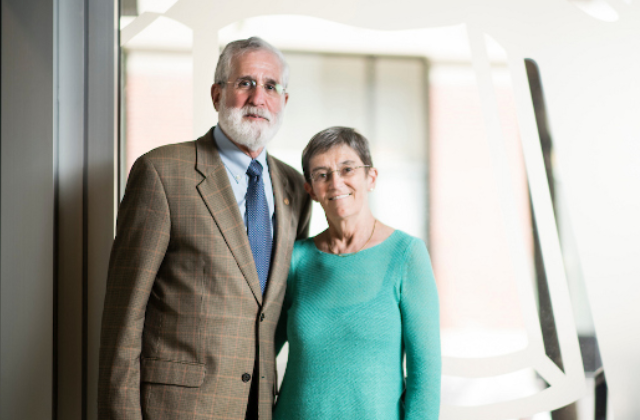Supporting Fellowships
The Rosenbergs fund a fellowship for young bioscientists at GSBS
Mentorship is enormously important in advancing the careers of students in science and medicine. Few can say their mentor created a fellowship to help young bioscientists—and still fewer can say that their mentor is dean of their school.
Danish Saleh, an M.D./Ph.D. student in neuroscience at GSBS, can lay claim to both as the first recipient of the Naomi Rosenberg, Ph.D., and Morton B. Rosenberg, D.M.D., D74, Fellowship.
“When I found out my award came from the dean, I thought it was quite serendipitous,” said Saleh, who is studying the underlying mechanisms involved in the body’s inflammatory response to bacterial pathogens while working in the laboratory of his doctoral advisor, Alexei Degterev, an associate professor of developmental, molecular and chemical biology.
Saleh describes Naomi Rosenberg, who has been dean of GSBS since 2004, as “a dynamic and dependable mentor. She is someone I look up to, and to be bestowed this honor in her name is pretty amazing.”
Rosenberg and her husband, Mort Rosenberg, an alumnus and a professor of oral and maxillofacial surgery emeritus at Tufts School of Dental Medicine and a professor of anesthesiology at Tufts School of Medicine, established the fellowship.
The Importance of Basic Science
The Rosenbergs have taught graduate, medical and dental students at Tufts for a combined 80 years. That longevity has made them particularly attuned to students’ challenges and financial burdens.
In establishing the fellowship, the couple sought to attract the brightest young biomedical researchers to GSBS and to support discovery-based science at a time when federal funding for research is declining. “Educating the next generation of scientists is an expensive proposition for the school,” Naomi Rosenberg said. “This is to help with those costs. But we also made this gift to demonstrate just how valuable this kind of education is, and to help it go forward.”
Saleh was a clear choice as the first Rosenberg Fellow. He is a co-author of a paper about the role of two proteins in cell death and inflammatory gene expression that was published in July 2016 in the highly regarded journal Immunity.
“Danish is very motivated as both a physician and a scientist. He’s driven to make his work have an impact,” said Naomi Rosenberg, who meets regularly with and advises M.D./Ph.D. students. After he was accepted to GSBS, Rosenberg was one of the first to get in touch to help him figure out his lab rotations.
Naomi Rosenberg came to Tufts School of Medicine in 1977, after completing a postdoc in the MIT laboratory of Nobel laureate David Baltimore. She was one of several faculty brought in to establish a cancer research center, and was among the graduate school's first faculty members when the school was founded in 1983. She has been a member of its graduate faculty since then and has served as the director of the school’s genetics program. She has been vice dean for research at the School of Medicine since 2007.
She has trained 29 Ph.D. students in her lab, and many of them have gone on to positions in academia and the biotechnology sector; one is a member of the National Academy of Sciences, an organization of the nation’s top researchers.
“Naomi is totally devoted to enhancing the educational offerings of the school and specifically to mentoring students,” said her husband, Mort, a 1974 graduate of Tufts’ dental school who completed a residency in anesthesiology at Tufts Medical Center. He led the dental school’s Division of Anesthesia and Pain Control before semi-retiring in May 2016.
It has been immensely gratifying, Naomi Rosenberg said, to watch her students grow into colleagues. “It has been such a privilege to work with students and have this experience,” she said. “I hope others consider the value of making a commitment to this kind of graduate education.”
This story was written by Divya Amladi and originally appeared in Tufts Now.
